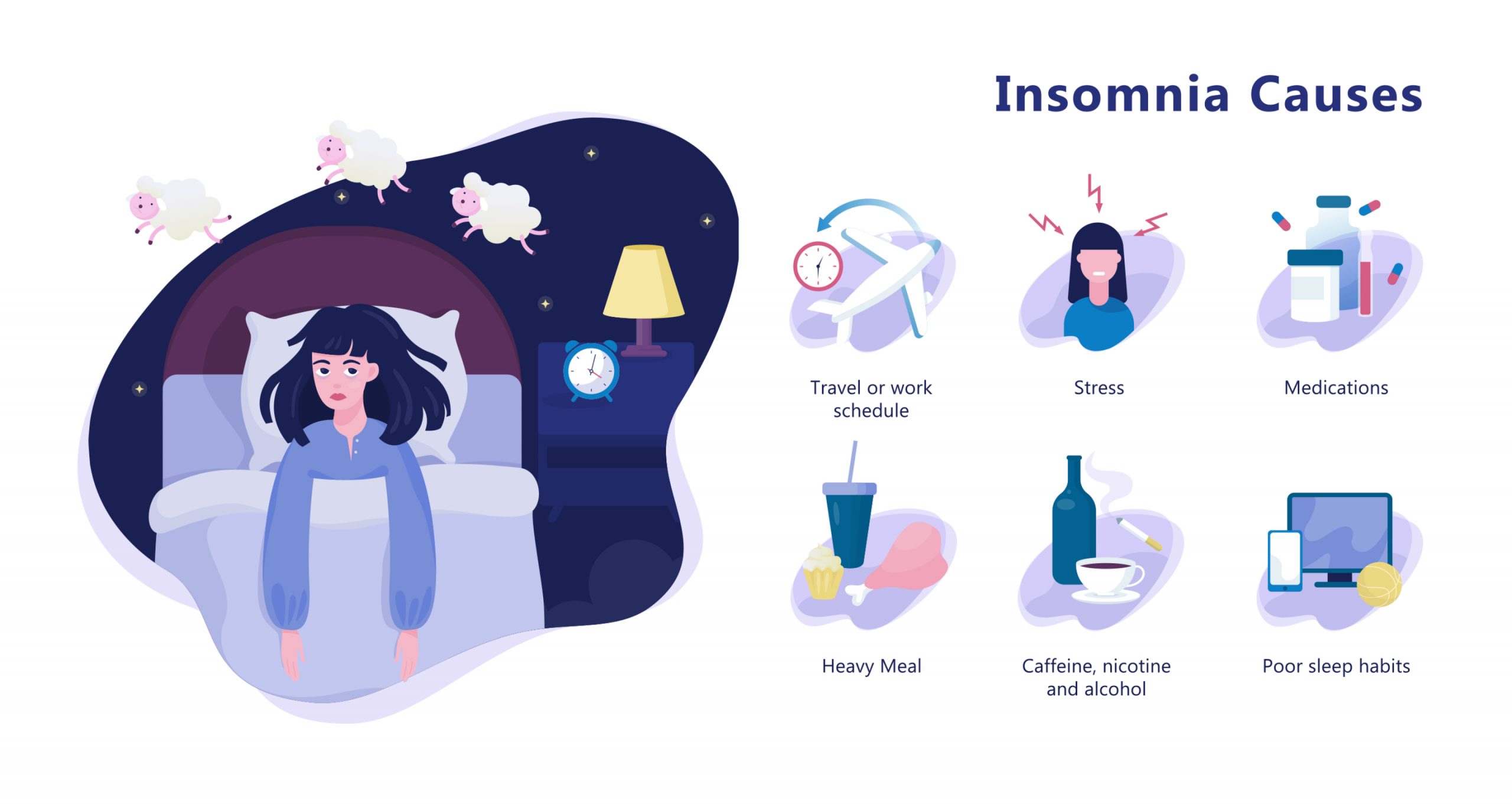Adult Sleep Disorders:
Information and Resources
Sleep disorders are conditions that disrupt normal sleep patterns. A sleep disorder adversely affects overall health, as there’s not enough chance of rest and recuperation. Sleep deprivation not only impacts health but also adversely affects the safety and quality of life.
Some signs of sleep disorders include:
- Excessive daytime sleepiness
- Irregular breathing
- Increased movement during sleep
- Irregular sleep-and-wake cycle
- Difficulty falling asleep

Types of Adult Sleep Disorders
Insomnia
Insomnia means that there’s trouble falling asleep or staying asleep throughout the night. It can be periodical with each episode lasting up to 3 weeks (short-term). Alternatively, insomnia can be long-lasting (or chronic).
Hypersomnia
This condition results in people being very sleepy and tired during the daytime. Hypersomnia can also cause them to sleep a lot. This condition can be caused by other disorders such as:
- Medical conditions (like fibromyalgia and low thyroid function).
- Mononucleosis or other viral illnesses.
- Narcolepsy and other sleep disorders.
- Obesity (especially if it causes obstructive sleep apnea).
When there’s no cause for sleepiness, then this is referred to as idiopathic hypersomnia.
Difficulty Sticking to a Sleep Schedule
A sleep disorder also occurs when one is unable to stick to a given sleep-and-wake schedule. Traveling between time zones and working shifts at different times of the day can cause the onset of this condition.
Some of the medical conditions that include a disrupted sleep schedule include:
- Irregular sleep-wake syndrome
- Jet lag syndrome
- Shift-work sleep disorder
- Delayed sleep phase (as a result of staying up late and sleeping late into the day)
- Advanced sleep phase (going to bed early and waking up very early the next day)
Types of Adult Sleep Disorders
Insomnia
Insomnia means that there’s trouble falling asleep or staying asleep throughout the night. It can be periodical with each episode lasting up to 3 weeks (short-term). Alternatively, insomnia can be long-lasting (or chronic).
Hypersomnia
This condition results in people being very sleepy and tired during the daytime. Hypersomnia can also cause them to sleep a lot. This condition can be caused by other disorders such as:
- Medical conditions (like fibromyalgia and low thyroid function).
- Mononucleosis or other viral illnesses.
- Narcolepsy and other sleep disorders.
- Obesity (especially if it causes obstructive sleep apnea).
When there’s no cause for sleepiness, then this is referred to as idiopathic hypersomnia.
Difficulty Sticking to a Sleep Schedule
A sleep disorder also occurs when one is unable to stick to a given sleep-and-wake schedule. Traveling between time zones and working shifts at different times of the day can cause the onset of this condition.
Some of the medical conditions that include a disrupted sleep schedule include:
- Irregular sleep-wake syndrome
- Jet lag syndrome
- Shift-work sleep disorder
- Delayed sleep phase (as a result of staying up late and sleeping late into the day)
- Advanced sleep phase (going to bed early and waking up very early the next day)

Treating Sleep Disorders
Treating sleep disorders often requires changes in one’s routines. Some of these include:
- Going to bed at the same time each night and rising at the same time each morning.
- Not napping during the day.
- Ending stressful chores or discussions in advance of bedtime.
- Relaxing before bedtime (for example, praying, journaling, stretching, etc.).
- Keeping your bedroom dark, quiet, and cool.
- Avoiding caffeine before bedtime.
- Not drinking alcohol before bed.
- Quitting smoking.
- Avoiding sleeping pills and other sedatives.
- Getting treatment for allergies or any nasal blockages that may hinder restful sleep.
- Exercising regularly and maintaining a healthy diet and weight.
- Avoiding large meals before bedtime.
- Removing electronics (like laptops and smartphones) from the bed.
Some other interventions include:
- Cognitive-behavioral therapy may be useful to deal with worries that keep one awake at night.
- Medications may also prove useful for dealing with sleep disorders.


![]()
Sleep Disorders Prognosis
Sleep disorders can result in more troubling illnesses such as obesity, glucose intolerance or diabetes, cardiovascular disease, hypertension, anxiety and depression. The good news is that since most sleep disorders are reversible, then it is possible to also reverse this prognosis.
![]()
Sleep Disorders Prognosis
Sleep disorders can result in more troubling illnesses such as obesity, glucose intolerance or diabetes, cardiovascular disease, hypertension, anxiety and depression. The good news is that since most sleep disorders are reversible, then it is possible to also reverse this prognosis.

Accessing Healthcare
for Sleep Disorders
Sleep disorders can wreak havoc in your daily life. However, the good news is that they are reversible. At Family Neurology, our specialists can help you overcome your sleep disorder. Give us a call today to set up an initial consultation.


Sleep Disorder Resources
Organizations
National Sleep Foundation (NSF)
This is a non-profit foundation that promotes public awareness of sleep and sleep disorders.
American Sleep Association
An organization dedicated to improving public health through increasing awareness about the importance of sleep and the dangers of sleep disorders.
Sleep Disorder Resources
Organizations
National Sleep Foundation (NSF)
This is a non-profit foundation that promotes public awareness of sleep and sleep disorders.
American Sleep Association
An organization dedicated to improving public health through increasing awareness about the importance of sleep and the dangers of sleep disorders.

Call Us to Make an Appointment
Phone: 713-589-7020
Fax: 713-999-9095
3301 Plainview St, Suite 8
Pasadena, Texas 77504

